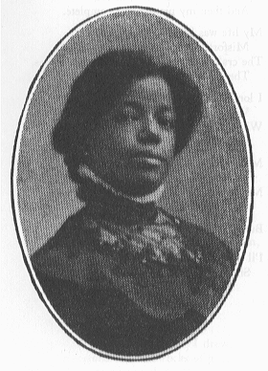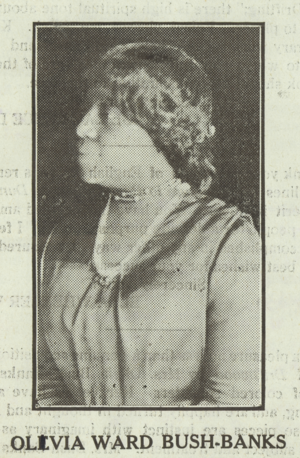Olivia Ward Bush-Banks facts for kids
Quick facts for kids
Olivia Ward Bush-Banks
|
|
|---|---|
 |
|
| Born | Olivia Ward February 27, 1869 Sag Harbor, Long Island, New York United States |
| Died | April 8, 1944 New York City, New York United States |
| Occupation |
|
| Nationality | American |
| Period | 1916–1930s |
Olivia Ward Bush-Banks (born Olivia Ward; February 27, 1869 – April 8, 1944) was an American writer. She was a talented poet and journalist. Olivia had both African-American and Montaukett Native American family roots.
She was proud of both parts of her heritage. Olivia showed this pride in her poems and stories. She wrote often for Colored American magazine. She also had her own column in the Westchester Record-Courier newspaper in New Rochelle, New York.
Contents
Early Life and Family
Olivia Ward was born on February 27, 1869. Her birthplace was Sag Harbor, New York, on Long Island. She was the youngest of three daughters. Her mother, Eliza Draper, had mixed African-American and Montaukett heritage. Her father, Abraham Ward, had Portuguese, East Indian, and African roots.
Olivia's mother passed away when Olivia was only about nine months old. Her father then moved the family to Providence, Rhode Island. When her father remarried, he asked Olivia's aunt, Maria Draper, to care for young Olivia. Aunt Maria raised Olivia as her own child.
School Days and Interests
Olivia went to local schools in Providence. In high school, she studied nursing. She also became very interested in drama and poetry. These interests would become a big part of her life.
Marriage and Children
In 1889, Olivia married Frank Bush. They had two daughters named Rosamund and Maria. Olivia and Frank divorced around 1895. After that, Olivia worked hard to support her daughters and her Aunt Maria, who was getting older.
Olivia was very close to her second daughter, Marie. She was also close to her granddaughter, Helen. Marie and Helen lived in New York. In 1916, Olivia married again to Anthony Banks. He worked as a Pullman porter on trains. Her first daughter, Rosamund, married but sadly died young in 1929.
Olivia Ward Bush-Banks passed away on April 8, 1944, in New York City.
Her Writing Career
Olivia often found work in Providence or Boston. She took any job she could to support her family. Even with long workdays, she kept writing. In 1899, she published her first book of poems. It was a small book called Original Poems.
A famous African-American poet, Paul Laurence Dunbar, gave her book great reviews. By 1900, Olivia was working in Boston. She was an assistant theater director at the Robert Gould Shaw Settlement House. She worked there until about 1914. A settlement house was a place that helped people in need.
Connecting with Her Roots
Olivia later moved back to Long Island with her daughters. Her interest in the arts grew even more. Her mother and aunt had been raised in the Montaukett culture. This heritage was very important to Olivia.
She lived on the eastern part of Long Island. There, she became the historian for the Montaukett tribe. She held this important role until about 1916. In 1914, she published her second and most popular book of poems, Driftwood.
Moving to Chicago and New Focus
Around 1918, Olivia moved to Chicago, Illinois. She moved with her second husband, Anthony Banks. His job with the Pullman Company was based there. In Chicago, she wrote her first play, Indian Trails: or Trail of the Montauk. Only parts of it still exist today.
After this play, she started writing more about the experiences of African Americans. Chicago was becoming a major city for black life, music, and culture. This was during the Great Migration. Many thousands of black people moved from the rural South to northern cities like Chicago.
Olivia became a regular writer for Colored American magazine. She strongly supported the "New Negro Movement." This movement celebrated black art and culture. She helped famous artists like sculptor Richmond Barthé and writer Langston Hughes get their start. Olivia wrote about the challenges faced by African Americans. She also wrote about the need for social change. Her faith in God was also a strong theme in her writing.
The Bush-Banks School
Olivia and Anthony Banks opened the Bush-Banks School of Expression in Chicago. This school became a special place for black artists to meet and share their art. Actors and musicians performed there. Olivia continued her artistic work, focusing on drama. She also taught drama in Chicago's public schools. From the late 1920s, she traveled between Chicago and New York. Her daughter Marie and her family lived in New York.
Later Years in New York
In the 1930s, Olivia moved back east. She lived in New Rochelle, New York and New York City. In 1936, she worked with the Works Progress Administration's Theatre Project. This was during the Great Depression. She was friends with many important people. These included civil rights leader W. E. B. Du Bois and poet Countee Cullen. She was also friends with actor and singer Paul Robeson.
In the 1930s, she wrote an arts column and was an arts editor for the Westchester Record-Courier newspaper. From 1936 to 1939, she also worked as a drama coach. This was at the Community Center of the Abyssinian Baptist Church. This church was an important place for music and art during the Harlem Renaissance.
Olivia wrote several plays and short stories. Most of them were never published. Some were not published because they talked about different cultures mixing.
Olivia's writing is important because it saved how people spoke in different regions and cultures. She also wrote about Native American life. She helped keep some of the Algonquian Montauk language and stories alive. She did this especially early in her career. Later, after moving to Chicago, she wrote more about the African-American experience. Her later works showed their political, cultural, and religious values.
Activism and Community Service
Olivia Ward Bush-Banks was active in many groups. She was involved with the North East Federation of Women's Clubs. She also volunteered with the Urban League in Chicago. She often worked with children at the Farren School.
In the summer of 1924, Olivia Ward Bush-Banks was a member of the Red Cap's Literary Club. She led a meeting and gave a speech there.
See also
 In Spanish: Olivia Ward Bush-Banks para niños
In Spanish: Olivia Ward Bush-Banks para niños
 | Sharif Bey |
 | Hale Woodruff |
 | Richmond Barthé |
 | Purvis Young |


